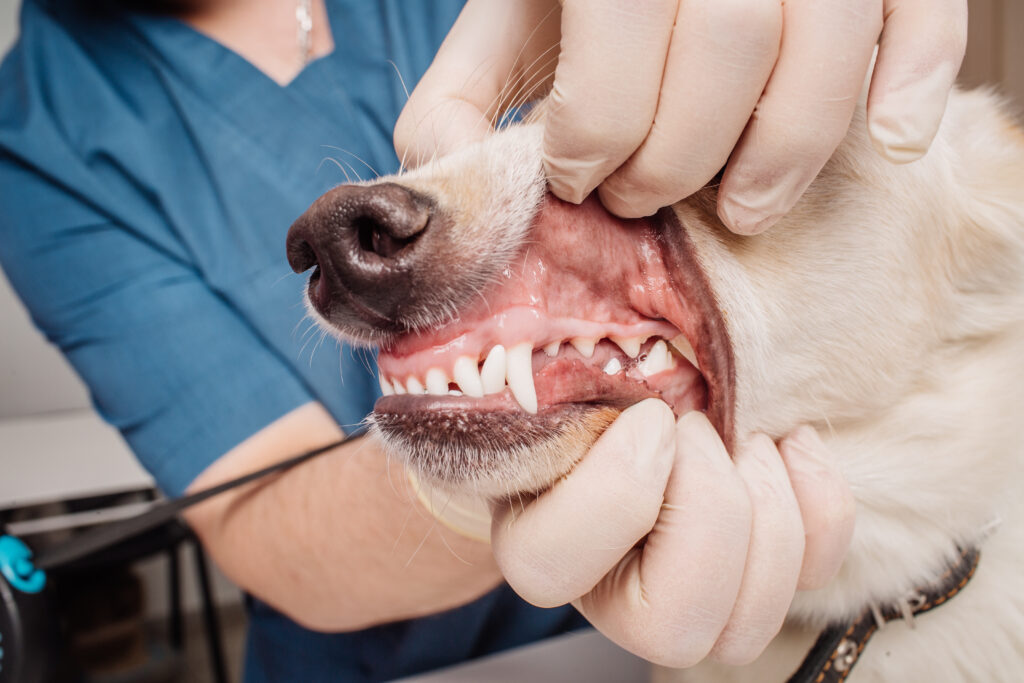When it comes to the health of our beloved dogs, their dental well-being is a topic that often goes unnoticed until it’s too late. We aim to shed light on dental disease in dogs: what it is, its causes, symptoms, and the significant impact it can have on their overall health. We’ll also discuss the importance of regular dental care and share practical tips to help prevent dental disease. If you have concerns or need more information, don’t hesitate to reach out to Berthoud Animal Hospital in Berthoud, CO, at (970) 532-2726.
What Exactly is Dental Disease in Dogs?
The first step in preventing dental disease in dogs is understanding what the condition entails. Let’s look at the nature of this common health issue and how it affects our dogs.
Dental disease in dogs, also known as periodontal disease, is one of the most common health issues our pets face. It starts with the buildup of plaque and tartar on the teeth and can progress to inflammation of the gums (gingivitis) and the deeper supporting structures of the teeth (periodontitis). If left untreated, it can lead to tooth loss, pain, and more severe health complications.
What Causes Dogs to Develop Dental Disease?
With dental disease being one of the most common conditions in dogs, you have to wonder: what causes it? Knowing what leads to periodontal disease can help you take preventative measures. Let’s explore the common causes and how they contribute to the development of this condition.
Several factors contribute to the development of dental disease in dogs. These include:
- Age and Breed: Older dogs and certain breeds are more prone to dental issues.
- Diet and Chew Habits: Soft foods can contribute to plaque buildup, while certain chew toys and treats might help reduce it.
- Oral Hygiene: Lack of regular teeth cleaning is a primary cause of dental disease.
- Genetic Factors: Some dogs are genetically predisposed to dental problems.
While it may seem simple that lack of proper dental care can inevitably lead to dental disease, sometimes there are other factors at play, too. It’s important to consider all of them to provide the best dental care for your pet.
What are the Symptoms of Dental Disease?
Spotting the early signs of dental disease and addressing them promptly can save your pet from discomfort and potentially lasting effects (such as missing teeth). Below are the most common symptoms of dental disease to be aware of. If your pet has any of these issues, you should contact our animal hospital for a checkup!
- Bad breath
- Red, swollen, or bleeding gums
- Difficulty eating or loss of appetite
- Loose or missing teeth
- Pawing at the mouth or face
- Discharge from the mouth
- Excessive drooling from discomfort
The Importance of Dental Hygiene
Dental hygiene is as important for pets as it is for people. Here’s what we recommend to preserve your dog’s oral health and in turn, prevent dental disease altogether.
- Begin your pet’s dental hygiene practices early. Start with daily teeth brushing sessions, and visit your vet as frequently as they recommend for checkups and, if needed, professional teeth cleanings.
- Ensure a balanced diet for your pet that minimizes plaque and tartar buildup.
- Regularly provide safe chew toys for your pet–anything that has enough give to not risk damaging the teeth.
- Schedule yearly dental checkups so we can assess your pet’s oral health and see whether they’re ready to have their teeth cleaned by our team.
The Consequences of Neglecting Dental Health
Oral health is often overlooked when it comes to our pets. This doesn’t often come from a lack of caring but simply a lack of awareness and not understanding the consequences of neglecting a pet’s dental needs. For many pets, dental disease starts to develop when they are as young as three years of age. Dental disease has several stages, with gingivitis, or inflamed gums, being one of the earlier signs. Bad breath, loose teeth, and thick, hardened buildup along the gum line are all characteristics of dental disease, and while many pets hide their discomfort, you can be sure they are still feeling the effects.
If dental disease is not caught and treated early, it can develop into a painful infection that destroys gum tissue, causing loose teeth and possible transmission of oral bacteria into your pet’s bloodstream. In more severe cases, pets can develop heart, liver, or kidney disease as a result of their poor oral health and hygiene. Your companion’s health and quality of life depend on routine pet dental care practices that reduce harmful plaque and tartar buildup and prevent bacterial infection from ever taking root.
Berthoud Animal Hospital Can Help with Your Pet’s Dental Care
At Berthoud Animal Hospital, we’re ready to support you in maintaining your dog’s dental health. Whether you’re looking for advice, regular checkups, or dental product recommendations, we’re here for you. Give us a call at (970) 532-2726 to schedule an appointment or talk to our experts about your dog’s dental health.





